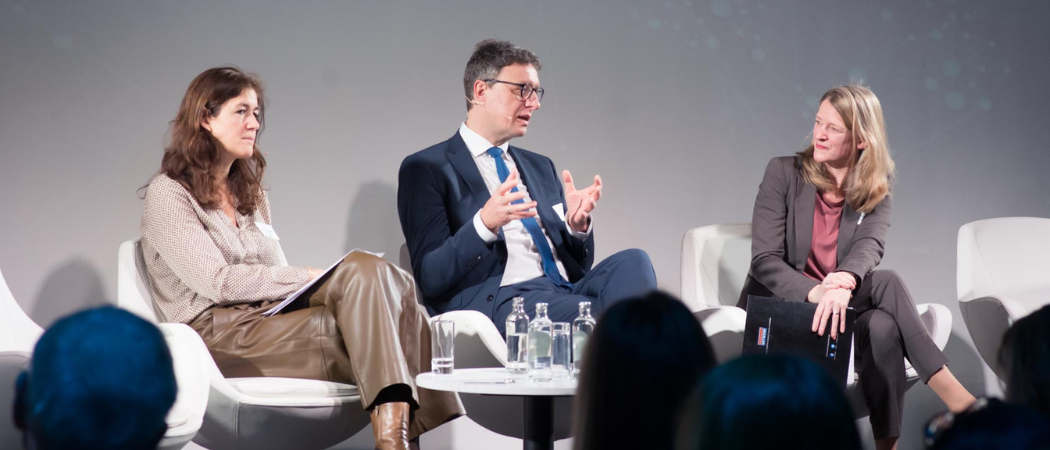If FP10 is opened up to defence and dual use research, the rest of the budget must be ringfenced, the annual Science|Business conference heard on Tuesday

From left to right: Annelien Bredenoord, rector magnificus at Erasmus University Rotterdam; Patrick Cramer, president of the Max Planck Society; Maryline Fiaschi, chief executive officer of Science|Business
With the war in Ukraine continuing to occupy minds across Europe, defence has become a central theme of discussions around the successor to Horizon Europe, Framework Programme 10.
It is important that other research areas do not see their budgets slashed to make space for more military research, stakeholders warned during the Science|Business conference, ‘What’s on the Horizon? Framing the next 40 years of European research and innovation’ on Tuesday.
“The military ought to put more money into FP10, rather than FP10 putting more money into dual use,” said Hermann Hauser, co-founder of European venture capital firm Amadeus Capital Partners and of the semiconductor design firm ARM.
University researchers and venture capitalist in Europe have traditionally been hesitant to invest in research with a military purpose, but attitudes have “completely changed” following Russia’s invasion of Ukraine, Hauser said. “We realised we’ve got to defend our way of life, and investing in dual use technologies is just something we have to do because all the other countries do it as well.”
The European Commission recently launched a public consultation with a view to reforming the rules for FP10, opening the way for it to support research with both civil and defence potential. Horizon Europe currently only funds projects with exclusively civil applications.
There have already been signs that civil research could lose out as Europe’s focus increasingly shifts from the green transition to building up defence capabilities.
Last week, the European Council and Parliament agreed a deal on the revision to the EU’s long-term budget, which includes a €1.5 billion top-up for the Strategic Technologies for Europe Platform (STEP), which is all earmarked for the European Defence Fund. Other technology areas covered by STEP will have to get funding from other sources, including Horizon Europe.
The US Defense Advanced Research Projects Agency (DARPA) has demonstrated many times over that military research can have broader spin-off effects. But this should not be used to justify taking money from research budgets, said Annelien Bredenoord, rector magnificus at Erasmus University Rotterdam, who is a member of the high level expert group carrying out the interim evaluation of Horizon Europe.
For FP10, “Only if there is a larger budget could part of it be allocated to more military-related research,” she said.
Diverting money from the larger research pot would be detrimental to scientific careers and pipelines in industry. “Research and innovation need long-term reasoning, which means you have to protect your research budgets a little bit, otherwise it’s still vulnerable and volatile,” Bredenoord said.
Defence must not be at the expense of science
Europe needs a strong foreign policy, but not at the expense of science, said Patrick Cramer, president of the Max Planck Society. “It would be a huge mistake to conclude that, because we need more defence, we take away some of the research budget, because defence politics and foreign politics always rely on very strong economies, and they rely on very strong science.”
The current seven-year Horizon Europe programme originally had a budget of €95.5 billion, but this has suffered a €2 billion cut as the EU sought to free up funds for Ukraine and for STEP.
In recent months, there have been repeated calls from MEPs, research associations, universities and industry for FP10 to have a budget of €200 billion.
The EDF, which supports collaborative defence research and capability development projects, has a budget of €8 billion for 2021-2027.
Industry participation
The debate over the second half of Horizon Europe and its successor comes at a time when corporate participation in the research and innovation programme is declining.
When it was first conceived 40 years ago, the first framework programme was exclusively aimed at industry. Today, however, there is an imbalance, as the private sector accounts for 60% of total investment into research in the EU, but only 28% of Horizon Europe funding goes to industry, Casper Garos, head of public-private partnerships programmes at the Dutch health-tech company Philips, told the conference.
Industry’s big concern is that Pillar 2 of Horizon Europe, which funds large-scale collaborative research, is becoming increasingly general and companies are struggling to find relevant projects, Garos said.
This is worrying, given industry support is needed to secure political backing for a strong framework programme. But for companies to engage, they must derive benefit. For this to happen, the research programmes should be integrated in a wider innovation-friendly environment that turns science into innovation.
Ina Sebastian, vice president for research at Infineon Technologies, says chip companies, like hers, need the right framework conditions to grow Europe’s market share in the sector. Talent, taxation, environmental regulation, energy prices, political stability and infrastructure, “are all the well-known factors for increasing our competitiveness and innovation capability,” she said.
Policy can help foster this environment, if it is designed to promote integration along the entire value chain of research. This is challenge Europe has struggled with, according to Robert-Jan Smits, president of the executive board of Eindhoven University of Technology in the Netherlands.
“We’re not optimising our investment in research,” Smits said. “You can pump a lot of money into health research, but if you don’t have the right regulatory framework, this money is going down the drain.”
But Europe is making progress, he notes, as debates on strategic autonomy take centre stage and usher in targeted policy. Next, Smits said, the high-level expert group that is advising the Commission on FP10 should sink its teeth into the issue.
Editor’s note: Hermann Hauser is an investor in Science|Business.
Editor’s note: This article has been updated 13 February to correct the figures on the share of Horizon Europe funding that goes towards industry.





 A unique international forum for public research organisations and companies to connect their external engagement with strategic interests around their R&D system.
A unique international forum for public research organisations and companies to connect their external engagement with strategic interests around their R&D system.